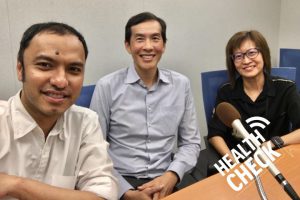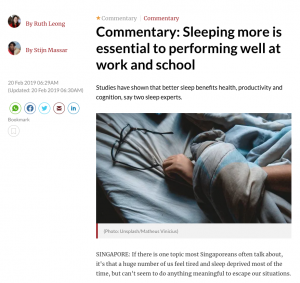Home > News Archive
News Archive
In the News
Many people feel the strong need to reclaim time for themselves, freeing themselves from the constant demands of their jobs, before sleep. But this can hurt their physical and mental health, say NUS academics.
Read MoreScience says that we need to pay attention to sleep. Read more about it in this article written in The Straits Times.
Read MoreThis has been achieved with the help of projects such as Singapore Spacer as well as the collective efforts of campus communities. Prof. Michael Chee speaks to the New York Times on this subject
Read MoreFeaturing the centre’s mission, research highlights, and recent achievements.
Read MoreFitbit sleep trackers made the cash register ring 16 million times in 2019, according to one report. But how much of the sleep data is actually usable? Dr. Michael Chee says there is one nugget of data from a wearable sleep tracker that you can depend on, and that deals with whether there’s an overall trend. Sleep staging? Nope. Sleep quality? Nope. Sleep duration? Yeah, kinda.
Read MoreCOVID-19 has changed the way we work, play and sleep. There are different strategies to better cope, says Yong Loo Lin School of Medicine’s Michael Chee.
Read MoreInsomnia can persist and when entrenched can be a misery. So start sleeping better now, says Duke-NUS Medical School’s Michael Chee. SINGAPORE: Mark Tan, a driven 40-year-old, was a competitive athlete in school. Academic success egged on by like-minded classmates took him to an elite university where it was a badge of honour to sacrifice sleep for grades and activities. He graduated to a good job but one where he was under constant pressure to perform. He engaged in fortnightly inter-continental travel and never said no to conference calls.
Read MoreHealth Check Ep 10: Can schools and parents help boost the cognition and well-being of sleep-deprived Singaporean teenagers? Synopsis: In this fortnightly podcast series on Tuesdays, The Straits Times guides you to healthier living, debunks the myths, and examines the impact of national policies with expert guests. To discuss why teenagers and students need to sleep more and how insufficient sleep affects them, ST correspondent Joyce Teo and podcasting head Ernest Luis host Prof Michael Chee, the director of the Centre for Cognitive Neuroscience at the Duke-NUS Medical School who is a prominent sleep expert.
Read MoreHealth Check Ep 9: Why sleep habits need to be formed when young Synopsis: In this fortnightly podcast series on Tuesdays, The Straits Times guides you to healthier living, debunks the myths, and examines the impact of national policies with expert guests. ST correspondent Joyce Teo and podcasting head Ernest Luis host Prof Michael Chee, the director of the Centre for Cognitive Neuroscience at the Duke-NUS Medical School, a prominent sleep expert who wants to change how we think about sleep.
Read MoreStudies have shown that better sleep benefits health, productivity and cognition, say two sleep experts. SINGAPORE: If there is one topic most Singaporeans often talk about, it’s that a huge number of us feel tired and sleep deprived most of the time, but can’t seem to do anything meaningful to escape our situations.
Read More








